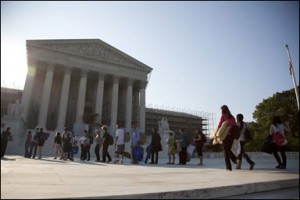US high court takes up bankruptcy misconduct case
By: KIMBERLY ATKINS, BridgeTower Media Newswires//October 30, 2012//
US high court takes up bankruptcy misconduct case
By: KIMBERLY ATKINS, BridgeTower Media Newswires//October 30, 2012//
 The U.S. Supreme Court will decide whether a judgment against a debtor for breaching the terms of a trust constitutes “defalcation” under the Bankruptcy Code and therefore disqualifies that debt from a bankruptcy discharge. The debtor in the case was the trustee of his father’s trust. A state court entered a judgment against the debtor for $285,000 for breaching the terms of the trust by self-dealing – specifically, making loans to himself from the trust’s assets.
The U.S. Supreme Court will decide whether a judgment against a debtor for breaching the terms of a trust constitutes “defalcation” under the Bankruptcy Code and therefore disqualifies that debt from a bankruptcy discharge. The debtor in the case was the trustee of his father’s trust. A state court entered a judgment against the debtor for $285,000 for breaching the terms of the trust by self-dealing – specifically, making loans to himself from the trust’s assets.
The debtor later filed for bankruptcy and sought to discharge the judgment under Chapter 7. The bankruptcy court concluded that the debtor could not discharge the judgment because he had been found to have breached his fiduciary duty by engaging in self-dealing and concluded that such conduct amounted to “fraud or defalcation while acting in a fiduciary capacity, embezzlement or larceny” under §523(a)(4) of the Bankruptcy Code.
A federal district court affirmed. The 11th Circuit also affirmed, rejecting the debtor’s argument that self-dealing did not fall within the meaning of the statute.
The debtor “knowingly benefitted from the loans,” the court reasoned. “Thus, his conduct can be characterized as objectively reckless, and as such, it rises to the level of a defalcation under §523(a)(4).”
A decision from the Supreme Court is expected later this term.
Bullock v. BankChampaign, No. 11-1518 . Certiorari granted: Oct. 29, 2012.
Legal News
- Waukesha man sentenced to 30 years for Sex Trafficking
- 12-year-old shot in Milwaukee Wednesday with ‘serious injuries’
- Milwaukee man convicted of laundering proceeds of business email compromise fraud schemes
- Giuliani, Meadows among 18 indicted in Arizona fake electors case
- Some State Bar diversity participants walk away from program
- Wisconsin court issues arrest warrant ‘in error’ for Minocqua Brewing owner
- Iranian nationals charged cyber campaign targeting U.S. Companies
- Facing mostly white juries, are Milwaukee County defendants of color truly judged by their peers?
- Milwaukee Mayor speaks in D.C. Tuesday at White House water summit
- Chicago man sentenced to prison after being caught with ‘Trump Gun’
- FTC bans non-competes
- Gov. Evers seeks applicants for Dane County Circuit Court
WLJ People
- Power 30 Personal Injury Attorneys – Russell Nicolet
- Power 30 Personal Injury Attorneys – Benjamin Nicolet
- Power 30 Personal Injury Attorneys – Dustin T. Woehl
- Power 30 Personal Injury Attorneys – Katherine Metzger
- Power 30 Personal Injury Attorneys – Joseph Ryan
- Power 30 Personal Injury Attorneys – James M. Ryan
- Power 30 Personal Injury Attorneys – Dana Wachs
- Power 30 Personal Injury Attorneys – Mark L. Thomsen
- Power 30 Personal Injury Attorneys – Matthew Lein
- Power 30 Personal Injury Attorneys – Jeffrey A. Pitman
- Power 30 Personal Injury Attorneys – William Pemberton
- Power 30 Personal Injury Attorneys – Howard S. Sicula











